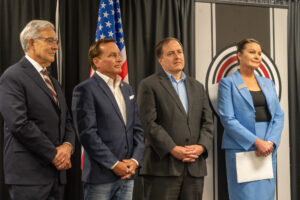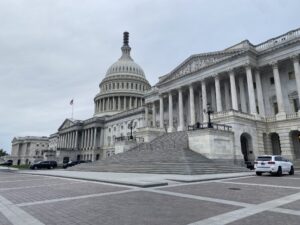9:00
News Story
‘Exploiting a loophole’: PACs tied to Missouri lobbyist draw new criticism
Steve Tilley, a lobbyist and adviser to the governor, is connected to six political action committees
One day earlier this month, a company called Phoenix Home Care cut $120,000 worth of checks to six different Missouri political action committees.
A few months earlier, a pair of companies suing the state to block a crackdown on unregulated slot machines combined to drop $350,000 into the same six PACs.
The companies and all six PACs have a connection: veteran statehouse lobbyist Steve Tilley.
The pattern — Tilley’s lobbying clients spreading donations among the constellation of PACs he has long been connected to — has begun raising serious concerns among campaign finance watchdogs.
Corporations are banned from giving directly to candidates in Missouri. And contribution limits cap how much a candidate can take from an individual or PAC.
Setting up multiple PACs opens the opportunity to skirt those regulations.
“This appears to be a way of cleverly exploiting a loophole in campaign finance law,” said Benjamin Singer, CEO of Show Me Integrity, a nonpartisan coalition focused on ethics in state government.
Questions swirling around how Tilley navigates Missouri’s campaign finance laws is nothing new. The former lawmaker and longtime adviser to Gov. Mike Parson was once the inspiration for legislators to change state law to specifically target some of his practices.
But in the years since, Tilley has continued to draw scrutiny — including from the FBI.
“I am not sure what to say about this except that Mr. Tilley has a long history of this kind of seriously gray area financial manipulation,” said Wally Siewert, a former professor of public ethics who serves as director of civic engagement for FOCUS St. Louis.
Tilley did not respond to a request for comment, but later tweeted that criticism of the PACs was “laughable.”
Loopholes

It’s not unusual for lobbying firms in Jefferson City to set up a single PAC to allow clients to donate. And some groups deploy multiple political action committees, such as how the Missouri Bank Association has statewide and regional PACs or labor unions have state and local affiliates.
But Tilley is connected to six PACs — MO Majority PAC, Missouri Growth PAC, Missouri C PAC, Missouri Senior PAC, Missouri AG PAC and Conservative Leaders of Missouri.
Last year, each was largely funded by Tilley’s various clients. And each donated to numerous candidates in the run up to the 2020 election.
For example, on Sept. 9, 2020, Missouri House Majority Leader Dean Plocher reported three contributions from Tilley-connected PACs — $2,000 from Missouri Growth PAC; $2,000 from MO Majority PAC; and $500 from Missouri Senior PAC.
A month earlier, state Rep. David Gregory, who is now a candidate for state auditor, received a $2,000 check from MO Majority PAC and a $2,600 check from Missouri C PAC.
State candidates are currently banned from accepting individual donations larger than roughly $2,600.
Under federal law, when two or more committees are affiliated, they share a single limit on the contributions they make to candidates and other political committees.
Missouri does not have a similar law, said Liz Ziegler, executive director of the Missouri Ethics Commission, the agency that enforces Missouri campaign finance law.
Missouri has language in its constitution banning someone from making a donation to a PAC with the intent to conceal the identity of the actual source of the money, Ziegler said. But otherwise, the general rule is that contribution limits apply to contributions PACs give, she said, not contributions given to PACs.
Tilley’s PACs should be a cause of concern for Missouri regulators, said Patrick Llewellyn, director of state campaign finance at the Washington, D.C.,-based Campaign Legal Center.
“Allowing corporations to direct their funds to candidates through intermediaries, such as PACs, seriously undermines a ban on corporate contributions to candidates,” he said.
FBI scrutiny
Tilley resigned from the legislature in 2012 to become a lobbyist and political consultant. When he did, he still had a massive campaign war chest of more than $1 million.
He invested most of that campaign money in shares of a closely-held bank located in his hometown of Perryville. Over the years, he also used the money to donate to candidates, many of whom would then hire his firm to advise their campaigns.
In 2016, lawmakers approved legislation limiting the ways in which money in a campaign committee can be invested and banning elected officials from holding on to their campaign money if they become lobbyists.
Under the law, former elected officials have to dissolve their campaign committee if they register as a lobbyist with the Missouri Ethics Commission. Any money they have has to be returned to donors, given to charity or donated to a political party organization. No campaign funds could be invested in businesses or hedge funds.
Tilley responded to the law change by shifting campaign funds to a newly created non-candidate committee, which eventually spawned other committees.
The six Tilley PACs have been embroiled in controversy before.
In 2017, one of Tilley’s clients, Gardner Capital, donated to four of his PACs. Those PACs then made donations that combined to total $10,000 to Independence Mayor Eileen Weir.
Just days after the donations, Weir and the city council voted to spend nearly $1 million to buy a golf course for a solar farm in a joint venture with Gardner Capital. The money used to purchase the golf club came from another Tilley lobbying client, the city’s utility, Independence Power & Light.
Numerous officials in Independence would subsequently report being questioned about the donations and the contract, though everyone involved denied any wrongdoing. Last year, the FBI requested records from Independence officials, and a federal grand jury issued a subpoena.
Tilley has continued to receive FBI attention regularly over the years for myriad reasons, from his role in the state’s medical marijuana industry to, in more recent months, an ambulance contract in Cole County.
An employee at Tilley’s lobbying firm recently told the St. Louis Post-Dispatch that the firm’s attorneys spoke with the FBI and determined none of the lobbyists are under investigation.
Rebecca Wu, spokeswoman for the FBI’s St. Louis field office, said in an email to The Independent that it is “the long-standing policy of the U.S. Department of Justice that the FBI does not confirm or deny the existence of an investigation.”
Our stories may be republished online or in print under Creative Commons license CC BY-NC-ND 4.0. We ask that you edit only for style or to shorten, provide proper attribution and link to our website. AP and Getty images may not be republished. Please see our republishing guidelines for use of any other photos and graphics.





